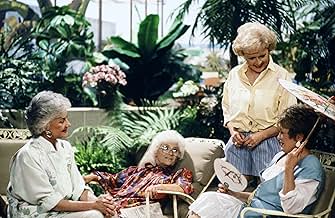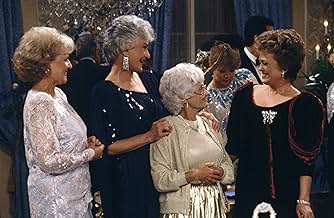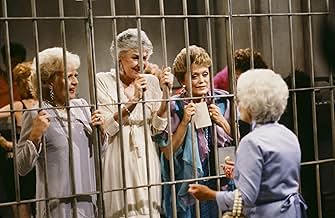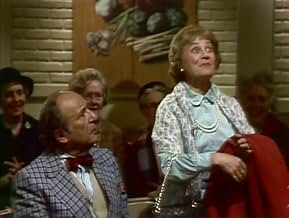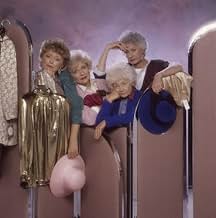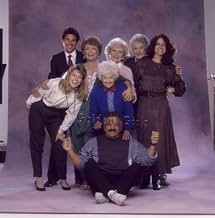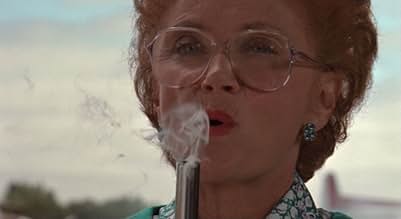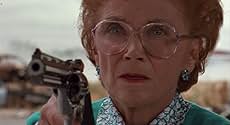Estelle Getty(1923-2008)
- Actress
- Soundtrack
She was truly one mother of a mom...on stage, on film and on TV. A favorite firecracker on 80s and 90s television, tiny character player Estelle Getty became best known for her carping, meddlesome moms -- complete with bemused, cynical looks, irreverent digs and dead-pan Henny Youngman-like one-liners. Blunt and down-to-earth off-stage as she was on-, she scored big points with both the young and the old...and all those who fell in between. The middle-class masses and society's underdogs deemed Estelle one of their own. The star who had a hard time playing the star card also taught an earnest lesson to the millions of actor wannabes that it was never too late to get into the big leagues, pursue your dream and come out a winner. After nearly five decades of stage work, she achieved "overnight" stardom at age 62. Ill health forced her retirement in 2000 after only a decade and a half of celebrity. Yet even something as sinister as Lewy body dementia, a degenerative brain disease, couldn't take away her indomitable spirit and feistiness. The affliction, which slowly clouds then erases the memory banks, should have claimed her a couple of years after its detection, but she proved the doctors wrong and lived nearly eight years from its onset, dying peacefully in her Hollywood home on July 22, 2008.
Getty was born Estelle Scher on July 25, 1923, on the Lower East Side of Manhattan in New York City, the daughter of Sarah (Lacher) and Charles Scher, Polish Jewish immigrants who worked in the glass business. Starry-eyed as a very young child when her father first took her to see a vaudeville show at the New York Academy of Music, Estelle already had a mindset about her future. She almost immediately started taking singing, dancing and acting lessons and, following her graduation from Seward Park High School, she began building up experience in the Yiddish theater. She even attempted the stand-up comedy stage on the Catskills "borscht belt" circuit in upstate New York, but it was a time of rampant sexism and women comics were a rarity and seldom successful. She wasn't. Her young life took an abrupt, post-World War II turn when she married New York businessman Arthur Gettleman at age 24 in December of 1947 (she went on to use a derivative of her married last name for the stage). Not your typical domesticated wife by any stretch of the imagination, Estelle nevertheless raised two children, sons Barry and Carl, and worked as a secretary for various companies.
Determined as ever to be an actress, she found moderate compensation performing in community theatre plays. Adept at playing abrasive, insinuating types, she had an innate gift for comedy and stole many scenes in such light-hearted plays as "Arsenic and Old Lace," "Blithe Spirit," "6 Rms Riv Vu," "Light Up the Sky" and "Lovers and Other Strangers". On the flip side, Estelle demonstrated surprising dramatic stamina in such classics as "All My Sons," "The Glass Menaqerie" and "Death of a Salesman." Following decades of obscurity, it was her connection to the actor/playwright Harvey Fierstein that turned the tide and started the ball rolling. Forging a deep friendship in the late 70s after appearing in small New York theaters together, and after considerable prodding by Estelle, Harvey wrote a part for his diminutive friend in the ground-breaking, autobiographical "Torch Song Trilogy". Playing Harvey's recalcitrant mother, the show eventually made it to Broadway and Estelle's big debut was a resounding success. Winning the Helen Hayes Award for her performance, she played the feisty foil to Fierstein's raspy-voiced drag queen for five years.
While on tour with the play in Los Angeles, Estelle secured an audition for and won the role of viper-tongued Sicilian mama Sophia Petrillo on The Golden Girls (1985). She nearly lost out on the part when it was thought that she appeared too young to play Bea Arthur's mother. In truth, Estelle was 14 months younger than Bea. Given another go-around, and this time donning a grey wig, age makeup and frumpy apparel, Estelle fully convinced the powers-that-be that she WAS Sophia and the rest is history. The role was a breath of fresh air during an era of strong political correctness. A seven-time consecutive Emmy Award nominee for "Best Supporting Actress Award," she took home the trophy in 1988. In both 1991 and 1992 Estelle won the American Comedy Award for "Best Supporting Actress" in a series. The Sophia character was so popular she even went on to play the impish octogenarian in several other shows, including two "Golden Girls" spin-offs -- the short-lived The Golden Palace (1992) and "Empty Nest". Estelle went on to mother other stars on the big screen as well, including Cher in Mask (1985) and Sylvester Stallone in Stop! Or My Mom Will Shoot (1992), in the latter of which she received second billing. The one maternal film role she wanted more than anything did not come her way. When Torch Song Trilogy (1988) was made into a film, actor Fierstein needed star power surrounding him. Anne Bancroft replaced Estelle in the part and she was heartbroken. The movie itself lost much of its impact in its transition from the stage. At the peak of her TV fame, Estelle wrote a 1988 autobiography entitled "If I Knew Then, What I Know Now... So What?" with Steve Delsohn.
The diminutive dynamo (4'10") with a big heart was an outspoken activist for gay rights and she regularly involved herself in AIDS causes, part of it propelled by a nephew who was diagnosed and later succumbed to the disease. She also became a spokesperson for Alternative Living for the Aging, a nonprofit organization that locates cooperative housing for senior citizens. In 2000, Getty stopped making public appearances after her health and mind began its slow decline. One of her last sightings was in the L.A. audience of "The Vagina Monologues," which starred "Golden Girls" co-star Rue McClanahan. Misdiagnosed as having both Parkinson's and Alzheimer's diseases, it was later learned she was suffering from advanced dementia. Estelle died of complications from her disease just three days before her 85th birthday. Long-time husband Arthur, who was only 5'3" tall himself, never adjusted to Estelle's meteoric rise and the media attention that had accompanied it. He quietly maintained her parents' glass business far from the Hollywood glitz...in Florida. He died in 2004. Lifetime television hosted a "Golden Girls" reunion, but by this time Estelle was too ill to appear. Shortly after her death on July 22, 2008, and in tribute to Ms. Getty, Lifetime, which shows reruns of "The Golden Girls" almost on a daily basis, announced that it would air ten episodes of the series featuring the "best of Sophia". A simple, unadorned service was conducted, as she would have wanted, and she was interred at Hollywood Forever Memorial Park in Los Angeles.
Getty was born Estelle Scher on July 25, 1923, on the Lower East Side of Manhattan in New York City, the daughter of Sarah (Lacher) and Charles Scher, Polish Jewish immigrants who worked in the glass business. Starry-eyed as a very young child when her father first took her to see a vaudeville show at the New York Academy of Music, Estelle already had a mindset about her future. She almost immediately started taking singing, dancing and acting lessons and, following her graduation from Seward Park High School, she began building up experience in the Yiddish theater. She even attempted the stand-up comedy stage on the Catskills "borscht belt" circuit in upstate New York, but it was a time of rampant sexism and women comics were a rarity and seldom successful. She wasn't. Her young life took an abrupt, post-World War II turn when she married New York businessman Arthur Gettleman at age 24 in December of 1947 (she went on to use a derivative of her married last name for the stage). Not your typical domesticated wife by any stretch of the imagination, Estelle nevertheless raised two children, sons Barry and Carl, and worked as a secretary for various companies.
Determined as ever to be an actress, she found moderate compensation performing in community theatre plays. Adept at playing abrasive, insinuating types, she had an innate gift for comedy and stole many scenes in such light-hearted plays as "Arsenic and Old Lace," "Blithe Spirit," "6 Rms Riv Vu," "Light Up the Sky" and "Lovers and Other Strangers". On the flip side, Estelle demonstrated surprising dramatic stamina in such classics as "All My Sons," "The Glass Menaqerie" and "Death of a Salesman." Following decades of obscurity, it was her connection to the actor/playwright Harvey Fierstein that turned the tide and started the ball rolling. Forging a deep friendship in the late 70s after appearing in small New York theaters together, and after considerable prodding by Estelle, Harvey wrote a part for his diminutive friend in the ground-breaking, autobiographical "Torch Song Trilogy". Playing Harvey's recalcitrant mother, the show eventually made it to Broadway and Estelle's big debut was a resounding success. Winning the Helen Hayes Award for her performance, she played the feisty foil to Fierstein's raspy-voiced drag queen for five years.
While on tour with the play in Los Angeles, Estelle secured an audition for and won the role of viper-tongued Sicilian mama Sophia Petrillo on The Golden Girls (1985). She nearly lost out on the part when it was thought that she appeared too young to play Bea Arthur's mother. In truth, Estelle was 14 months younger than Bea. Given another go-around, and this time donning a grey wig, age makeup and frumpy apparel, Estelle fully convinced the powers-that-be that she WAS Sophia and the rest is history. The role was a breath of fresh air during an era of strong political correctness. A seven-time consecutive Emmy Award nominee for "Best Supporting Actress Award," she took home the trophy in 1988. In both 1991 and 1992 Estelle won the American Comedy Award for "Best Supporting Actress" in a series. The Sophia character was so popular she even went on to play the impish octogenarian in several other shows, including two "Golden Girls" spin-offs -- the short-lived The Golden Palace (1992) and "Empty Nest". Estelle went on to mother other stars on the big screen as well, including Cher in Mask (1985) and Sylvester Stallone in Stop! Or My Mom Will Shoot (1992), in the latter of which she received second billing. The one maternal film role she wanted more than anything did not come her way. When Torch Song Trilogy (1988) was made into a film, actor Fierstein needed star power surrounding him. Anne Bancroft replaced Estelle in the part and she was heartbroken. The movie itself lost much of its impact in its transition from the stage. At the peak of her TV fame, Estelle wrote a 1988 autobiography entitled "If I Knew Then, What I Know Now... So What?" with Steve Delsohn.
The diminutive dynamo (4'10") with a big heart was an outspoken activist for gay rights and she regularly involved herself in AIDS causes, part of it propelled by a nephew who was diagnosed and later succumbed to the disease. She also became a spokesperson for Alternative Living for the Aging, a nonprofit organization that locates cooperative housing for senior citizens. In 2000, Getty stopped making public appearances after her health and mind began its slow decline. One of her last sightings was in the L.A. audience of "The Vagina Monologues," which starred "Golden Girls" co-star Rue McClanahan. Misdiagnosed as having both Parkinson's and Alzheimer's diseases, it was later learned she was suffering from advanced dementia. Estelle died of complications from her disease just three days before her 85th birthday. Long-time husband Arthur, who was only 5'3" tall himself, never adjusted to Estelle's meteoric rise and the media attention that had accompanied it. He quietly maintained her parents' glass business far from the Hollywood glitz...in Florida. He died in 2004. Lifetime television hosted a "Golden Girls" reunion, but by this time Estelle was too ill to appear. Shortly after her death on July 22, 2008, and in tribute to Ms. Getty, Lifetime, which shows reruns of "The Golden Girls" almost on a daily basis, announced that it would air ten episodes of the series featuring the "best of Sophia". A simple, unadorned service was conducted, as she would have wanted, and she was interred at Hollywood Forever Memorial Park in Los Angeles.
Funny Women of Television
Funny Women of Television
We salute the brilliant women behind all those unforgettable laughs on the small screen.


